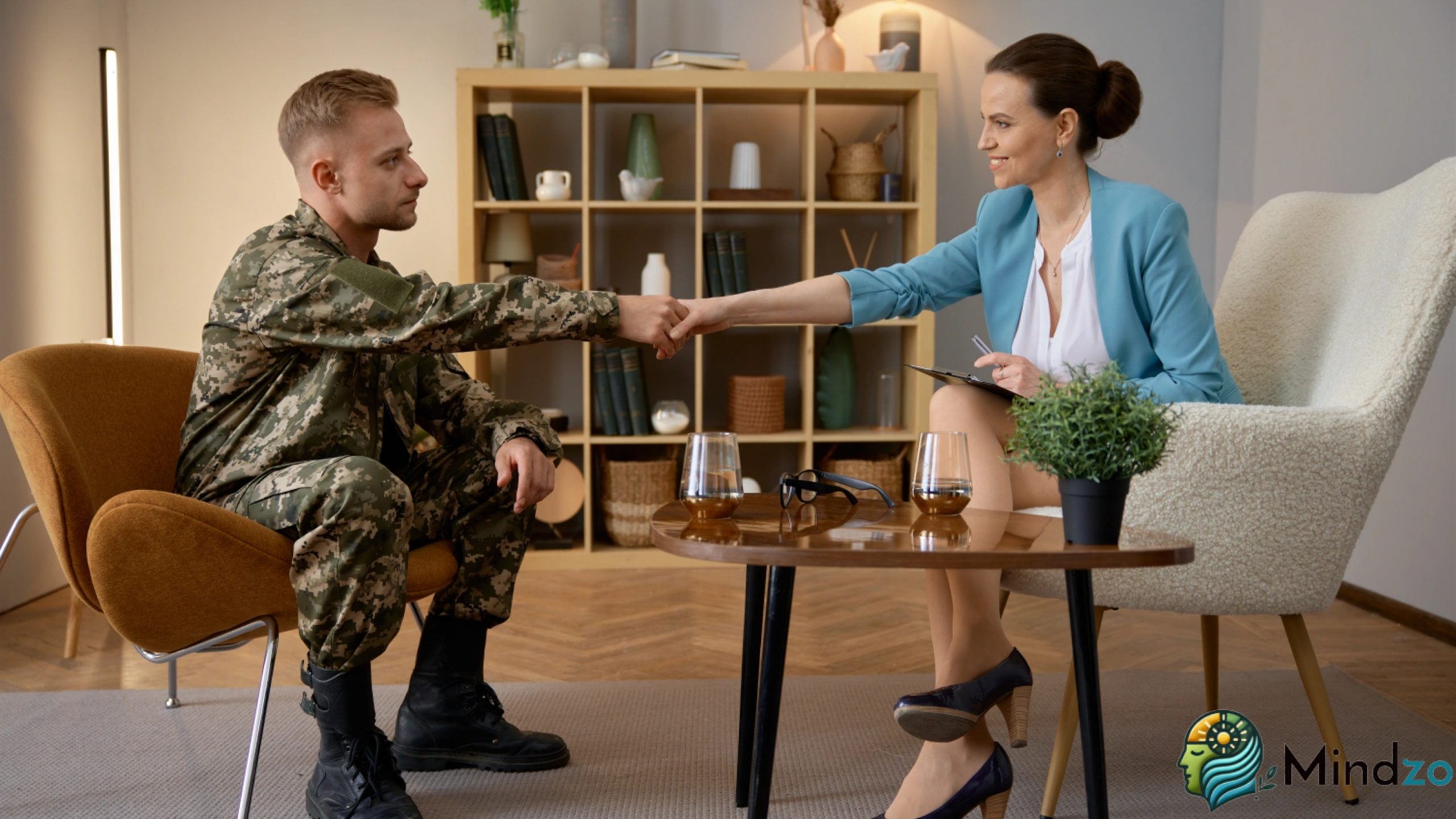From Service to Self-Care: A Veteran’s Guide to Mental Wellness

You’ve served your country with courage, dedication, and sacrifice. You’ve faced challenges most people will never understand. You’ve put your life on the line for others, operated under extreme stress, and carried responsibilities that would break many. But now that you’re transitioning from active service or adjusting to veteran life, there’s another mission that deserves your attention: taking care of your mental health.
This isn’t about weakness. It’s not about failure. It’s about recognizing that service takes a toll – and that you deserve the same care and attention you’ve given to your mission, your unit, and your country.
The Reality of Veteran Mental Health
Let’s start with the facts. Mental health challenges among veterans are significant and well-documented. Studies show that approximately 14-20% of veterans who served in recent conflicts experience post-traumatic stress disorder (PTSD) or depression.
These aren’t just statistics – they represent real people who’ve served honorably and are now struggling to find their footing in civilian life or dealing with the aftermath of their service. If you’re one of them, you’re in good company, and there’s absolutely no shame in acknowledging that you need support.
Why Veterans Face Unique Mental Health Challenges
Military service creates experiences that fundamentally differ from civilian life. Understanding why veterans face particular mental health challenges can help normalize these struggles and point toward effective solutions.
Combat Exposure and Trauma
The most obvious factor is combat exposure. Witnessing death, experiencing life-threatening situations, sustaining injuries, or losing fellow service members creates profound psychological wounds. Improvised explosive devices (IEDs), firefights, and the constant threat of danger create a level of sustained stress that few civilians ever experience.
But trauma isn’t limited to combat. Military sexual trauma, accidents during training, and other service-related traumatic events also leave lasting marks. The nature of military trauma – often repeated, intense, and occurring during formative years – makes it particularly challenging to process and overcome.
The Military-to-Civilian Transition
Leaving military service represents one of life’s most significant transitions. You’re not just changing jobs – you’re leaving behind an entire culture, identity, and support system. The clear structure, mission-driven purpose, and tight-knit camaraderie that defined your military life suddenly disappear.
Many veterans describe feeling lost, directionless, or like they no longer fit anywhere. The civilian world operates differently, values different things, and often doesn’t understand or appreciate what you’ve experienced. This cultural gap can feel isolating and disorienting.
Loss of Identity and Purpose
For many service members, the military isn’t just what they did – it’s who they were. Your rank, your unit, your accomplishments, and your mission gave you identity and purpose. Civilian life can feel meaningless by comparison, especially when you’re searching for work that feels as important as what you left behind.
This loss of identity often goes unrecognized but contributes significantly to depression and anxiety among veterans. Who are you when you’re no longer defined by your service?
Hypervigilance and Difficulty Relaxing
Military training teaches you to stay alert, scan for threats, and be ready to respond instantly. In combat zones, this hypervigilance keeps you alive. But back home, it becomes exhausting. Always checking exits, sitting with your back to the wall, startling at loud noises, having difficulty sleeping – these aren’t character flaws. They’re your brain still trying to protect you from dangers that are no longer present.
This constant state of high alert drains your mental resources and makes it difficult to relax, connect with loved ones, or enjoy activities that once brought pleasure.
Survivor’s Guilt and Moral Injury
Many veterans struggle with survivor’s guilt – questioning why they made it home when others didn’t. Others experience moral injury: lasting psychological wounds from actions taken during service that conflict with their values, or from betrayals by leadership or institutions they trusted.
These wounds can be even more difficult to heal than PTSD from life-threatening events because they strike at your core sense of self and morality.
Relationship Challenges
Military service strains relationships. Deployments mean long separations. Trauma changes people. The difficulty communicating about experiences your loved ones can’t understand creates distance. Many veterans find that the relationships they returned to feel different, or they struggle to form new connections.
Isolation compounds other mental health challenges, creating a downward spiral that’s difficult to escape alone.
Common Mental Health Conditions Among Veterans
Post-Traumatic Stress Disorder (PTSD)
PTSD is perhaps the most well-known mental health challenge veterans face. Symptoms include intrusive memories or flashbacks, nightmares, avoidance of reminders of trauma, negative changes in thinking and mood, and hyperarousal (being easily startled, feeling on edge, having difficulty sleeping).
PTSD isn’t weakness – it’s a normal response to abnormal experiences. Your brain is trying to process overwhelming events, and sometimes it gets stuck replaying them.
Depression
Depression in veterans can manifest as persistent sadness, loss of interest in activities, changes in sleep or appetite, difficulty concentrating, feelings of worthlessness, or thoughts of death. Sometimes depression appears as anger, irritability, or physical pain rather than sadness.
The transition challenges, loss of identity, trauma exposure, and isolation many veterans face create a perfect storm for depression.
Anxiety Disorders
Beyond PTSD, many veterans experience generalized anxiety, panic attacks, or social anxiety. Constant worry, physical symptoms like racing heart or shortness of breath, and difficulty managing uncertainty are common experiences.
Traumatic Brain Injury (TBI) Effects
Many veterans have experienced TBIs from blasts, impacts, or accidents. TBI can cause symptoms that overlap with or exacerbate mental health conditions: memory problems, mood changes, difficulty concentrating, and personality shifts.
Breaking Through the Barriers to Getting Help
Despite the prevalence of mental health challenges, many veterans don’t seek help. Understanding and addressing these barriers is crucial.
The Stigma Factor
Military culture values toughness, self-reliance, and mission accomplishment. Admitting you’re struggling can feel like admitting weakness or failure. You might worry about how seeking help will affect your career (if still serving) or how others will perceive you.
Here’s the truth: seeking help is not weakness. It takes tremendous courage to acknowledge pain and ask for support. The strongest warriors are those who recognize when they need backup and aren’t afraid to call for it.
Not Knowing Where to Start
The system for accessing mental health care can feel confusing and overwhelming, especially when you’re already struggling. Where do you go? What services are available? Will you be able to afford treatment?
Fear of Medication or Treatment
Some veterans worry that mental health treatment means being prescribed medication they don’t want, or that therapy won’t help. These are valid concerns worth discussing with providers, and you have options.
Privacy Concerns
Worries about privacy – whether seeking help will be documented somewhere or affect future opportunities – keep some veterans from reaching out. Most mental health treatment is confidential, and seeking help generally protects rather than harms your future.
Practical Steps Toward Mental Wellness
Acknowledge What You’re Experiencing
The first step is honest self-assessment. Are you drinking more than you used to? Avoiding situations or people? Having trouble sleeping? Feeling angry, numb, or hopeless? Recognizing these signs without judgment is essential.
Reach Out for Professional Support
The VA offers comprehensive mental health services for eligible veterans, including same-day care for urgent needs. Services include individual therapy, group counseling, medication management when appropriate, specialized PTSD treatment programs, substance use treatment, and family counseling.
Evidence-based treatments like Cognitive Processing Therapy (CPT) and Prolonged Exposure (PE) have strong research support for treating PTSD. These therapies aren’t easy – they require confronting painful memories – but they work.
If you’re not enrolled in VA healthcare or prefer other options, many community organizations offer free or low-cost mental health services specifically for veterans. Some providers specialize in military culture and veteran issues, which can make treatment feel more comfortable and relevant.
Connect with Other Veterans
Peer support is incredibly powerful. Talking with other veterans who’ve had similar experiences reduces isolation and provides understanding that civilians often can’t offer. Many communities have veteran support groups, either through the VA, veteran service organizations, or independent organizations.
Develop Healthy Coping Strategies
While professional treatment is important, daily self-care practices support overall wellness:
- Physical activity: Exercise reduces anxiety and depression symptoms, improves sleep, and provides a healthy outlet for stress.
- Routine and structure: Creating predictable daily routines can provide the structure many veterans miss from military life.
- Mindfulness and meditation: These practices help manage hypervigilance and reduce anxiety.
- Limiting alcohol: While it might seem to help in the moment, alcohol ultimately worsens mental health.
- Quality sleep: Prioritize sleep hygiene – consistent sleep schedules, dark and quiet environment, limiting screens before bed.
Find New Purpose and Meaning
Many veterans find that volunteer work, mentoring other veterans, or careers in service-oriented fields help fill the purpose gap left by military service. This doesn’t happen overnight, but actively exploring what gives your life meaning can significantly improve mental wellness.
Involve Your Family
If you have family or close friends, consider involving them in your healing journey. Family therapy or education programs can help loved ones understand what you’re experiencing and how they can support you. Your mental health affects them too, and healing often works better when it includes your support system.
Be Patient with Yourself
Recovery isn’t linear. You’ll have good days and difficult days. Progress might feel slow. Treatment takes time to work. Be as patient and compassionate with yourself as you would be with a fellow service member facing similar struggles.
Resources Available to You
You have access to numerous resources, many at no cost:
Veterans Crisis Line: If you’re in crisis, call 988 and press 1, text 838255, or chat online. This service is free, confidential, and available 24/7. You don’t need to be enrolled in VA healthcare to use it.
VA Mental Health Services: Contact your local VA medical center to access mental health services, including same-day care for urgent needs.
Vet Centers: These community-based counseling centers provide free services to veterans and their families in a non-clinical setting that many veterans find more comfortable than traditional healthcare facilities.
Military OneSource: Free support services for service members and their families, including confidential counseling.
You’ve Already Proven Your Strength
You’ve faced challenges most people can’t imagine. You’ve demonstrated courage under fire, persevered through difficult training, and served something larger than yourself. Taking care of your mental health requires that same courage and perseverance.
Your service may have ended, but your value didn’t. You deserve to live a full, meaningful life beyond your service. You deserve to sleep peacefully, feel hopeful about the future, and enjoy connections with people you care about. You deserve support in achieving those things.
Asking for help isn’t giving up – it’s continuing to fight, this time for yourself. It’s recognizing that some battles can’t be won alone, and that’s okay. Your service matters. Your wellbeing matters. You matter.
The mission now is taking care of yourself with the same dedication you once gave to your service. That mission starts by reaching out.
Resources
https://www.veteranscrisisline.net
https://www.woundedwarriorproject.org
-
 Beyond Words: The Emotional Medicine of a Simple HugOctober 27, 2025
Beyond Words: The Emotional Medicine of a Simple HugOctober 27, 2025 -
 Music’s Unique Therapeutic BenefitsOctober 23, 2025
Music’s Unique Therapeutic BenefitsOctober 23, 2025

Leave a Reply